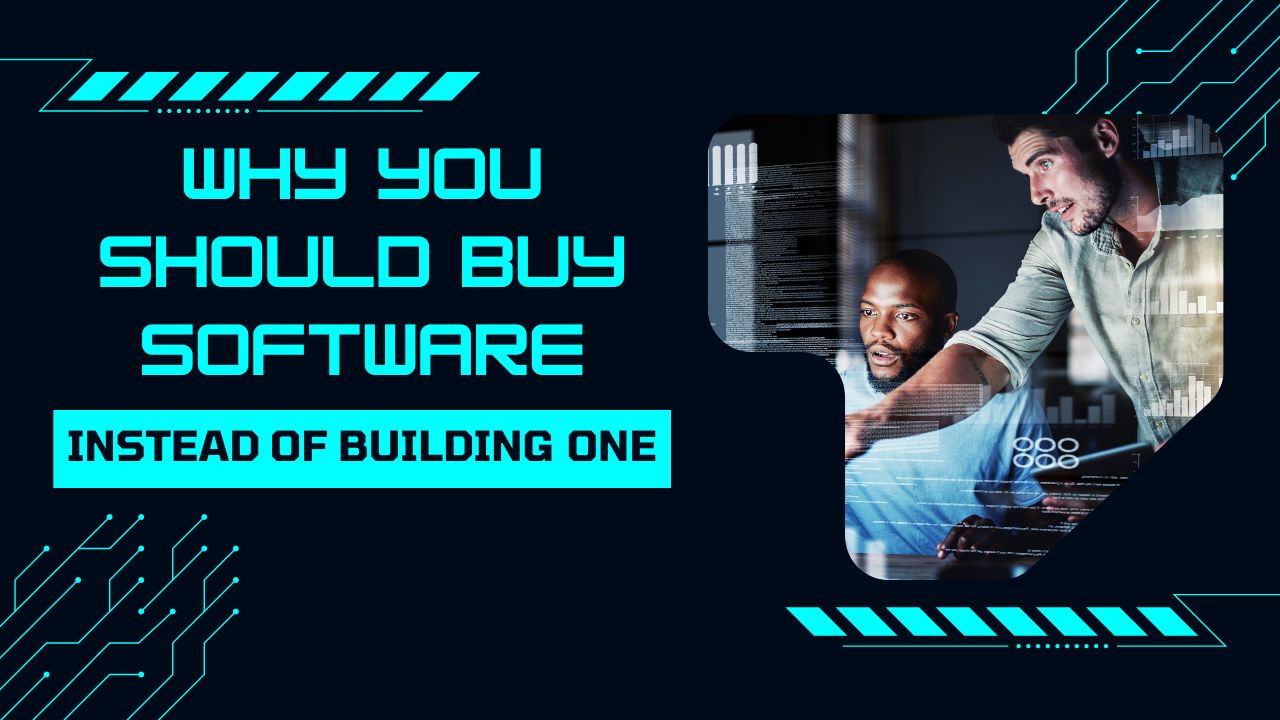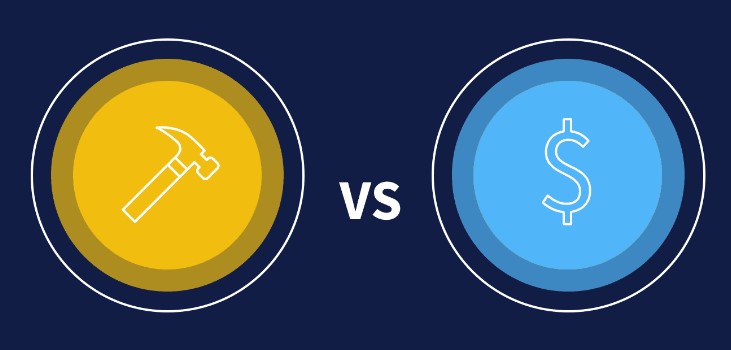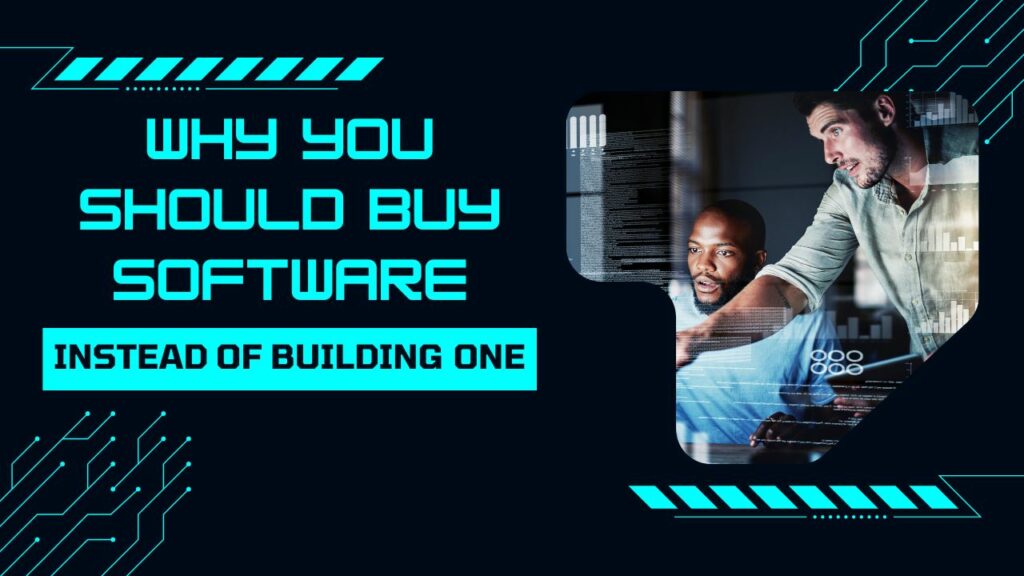 With the technology today, businesses and individuals may still have a hard time choosing between buying or building software. Although building software has its own benefits, there could be downsides too. In this article, we will discuss why should you buy software instead of building one.
With the technology today, businesses and individuals may still have a hard time choosing between buying or building software. Although building software has its own benefits, there could be downsides too. In this article, we will discuss why should you buy software instead of building one.
What is Build vs. Buy?
Build vs. Buy is an important decision-making process that individuals and organizations go through when considering the acquisition of software solutions. Simply, it involves evaluating whether to build software from scratch or purchase one, based on their needs.
Building software refers to developing a tailored solution in-house. It could also mean hiring a software development team to create custom software. Software building allows you to have complete control over its features, functionality, and design. But you should also keep in mind that it requires a substantial investment of time, resources, and expertise.
On the other hand, buying software is selecting a pre-existing product from a third-party provider or a vendor. These software are ready-made solutions that will help you address common business needs. Typically, these software come with a range of features and support options.
In general, buying software will surely save you time and effort. Doing so eliminates the need to build one from scratch. But it may require some adjustments to fit your needs and requirements.
The Build vs. Buy decision is crucial because it directly impacts factors like cost, development time, scalability, maintenance, and the ability to address immediate business needs effectively. Organizations must carefully assess their unique requirements, budget, and long-term goals before making the choice between building custom software or purchasing a pre-made solution.

You might also like: 17 Best Task Management Software for Individuals in 2023
Things to consider when buying a software
Ease of deployment

When buying software, ease of deployment is a crucial factor to consider to ensure a smooth implementation process. Here are some key aspects to keep in mind:
- Installation and setup. Buy software that offers a straightforward installation process and clear setup instructions. Avoid ones that require complex configurations or specialized technical knowledge.
- Compatibility. Make sure that you buy software that is compatible with your existing hardware, operating systems, and other applications. Compatibility issues may lead to delays and additional costs during deployment.
- Cloud-based options. Consider cloud-based software solutions. This software usually offers faster and more straightforward deployment.
- Data migration. Always asses the migration process and make sure it’s seamless. We recommend doing this if you are buying software that involves data migration.
- Training and support. Make sure to check if the software vendor offers comprehensive training resources and support during the deployment phase.
- Scalability. Evaluate whether the software can scale as your business grows. A solution that can accommodate increased user numbers or data volumes without major reconfigurations will save you time and resources in the long run.
You might also like: Elevate Excellence: Discover the Best Software Quality Assurance Certification
Lack of custom solution

When buying software, the lack of a custom solution is an essential consideration. Here are some key aspects to keep in mind:
- Fit for Purpose. Assess whether the purchased software aligns with your specific business needs. While pre-made software can be feature-rich, it might not address all your unique requirements, potentially leading to inefficiencies.
- Scalability. Consider whether the software can accommodate future growth and changing needs. A lack of customizability could limit the software’s ability to adapt to your evolving business demands.
- Integration. Evaluate the software’s compatibility with your existing systems and tools. Lack of customization might hinder seamless integration, leading to data silos and reduced efficiency.
- Workflow Adaptation. Determine if the software’s workflow matches your existing processes or if your team needs to adjust significantly. An inflexible solution might disrupt your established work routines.
- Competitive Advantage. Custom solutions can provide a competitive edge by tailoring functionalities to your unique business model. Off-the-shelf software may not offer the same differentiation.
- Long-term Costs. While pre-made software can be cost-effective initially, the lack of customization might lead to additional expenses as you seek workarounds or need to invest in complementary tools.
- Vendor Support. Confirm whether the software vendor provides responsive customer support and updates. A lack of custom solutions could mean relying on the vendor’s expertise for issue resolution.
Things to consider when building a software

It needs the effort to deploy
When building software, one crucial factor to consider is the effort required to deploy the application successfully. This involves the following:
- Evaluating the complexity of the development process
- Timeframes for coding and testing
- Resources needed to ensure a smooth and efficient deployment.
Custom software development can be time-consuming and resource-intensive, so careful planning and project management are essential to avoid unnecessary delays and ensure a seamless implementation.
Long-term adaptability
If you are planning to build your software solution from scratch, long-term adaptability is a critical consideration. This involves assessing the application’s scalability, flexibility, and ability to accommodate future changes and advancements in technology. The software should be designed to grow with the organization’s needs and be easily adaptable to evolving business requirements. Prioritizing modular architecture, clean code, and well-documented processes will facilitate future updates and enhancements, reducing the need for significant rework as the software evolves over time.
You might also like: Unveiling the 10 Best Software Monitoring Tools in 2023
Why you should buy a software
Here are the reasons why you should buy software for your business or personal needs instead of building one from scratch:
You know it already works
Buying software offers the advantage of immediate access to a proven and reliable solution. When you purchase a pre-made software product, it has already undergone development, testing, and real-world usage by other customers. This extensive vetting process ensures that the software functions as intended meets industry standards, and has undergone rigorous quality assurance checks. As a result, you can be confident that the software is stable, reliable, and capable of fulfilling its intended purpose without unexpected issues or errors.
The assurance of a working solution can save significant time and resources compared to building custom software from scratch. Developing software in-house involves an extensive development lifecycle, including design, coding, testing, and debugging, which can be time-consuming and complex. By choosing to buy software, organizations can bypass this lengthy process and quickly deploy a fully functional solution to meet their needs. Moreover, established software vendors often provide customer support, updates, and ongoing maintenance, ensuring that the software remains up-to-date and compatible with evolving technologies, further enhancing its long-term reliability and value.
Fast implementation with predefined features and functionalities
Buying software ensures a swift implementation process by providing predefined features and functionalities that are readily available for use. When you purchase a pre-made software solution, you gain access to a comprehensive set of features designed to address common business needs.
The pre-defined features and functionalities offered by purchased software are typically based on industry best practices and user feedback, ensuring a level of reliability and performance. This streamlines the implementation process, as you can leverage the vendor’s expertise and experience in creating a product that caters to a wide range of user requirements. Additionally, many pre-made software solutions provide customization options, allowing you to tailor the software to your specific needs without the time-consuming process of building everything from scratch. With the convenience of predefined features and a faster implementation time, buying software can be a strategic choice to improve productivity and achieve business objectives promptly.
Eliminates development risks
By choosing to buy software, organizations can also bypass the challenges associated with custom development, such as technical complexities, resource constraints, and time-intensive coding and debugging. This saves valuable time and effort, enabling businesses to focus on deploying the software quickly and efficiently. Additionally, established software vendors often provide ongoing support and updates, ensuring that the software remains current and compatible with evolving technologies. This level of support further reduces the risk of operational disruptions and ensures a seamless experience for end-users, making purchasing software a prudent choice for mitigating development risks.
Predictable costs
Buying a software solution ensures predictable costs as the price is typically upfront and transparent. With pre-made software, you know the total cost before implementation, avoiding unexpected expenses associated with custom development, such as scope changes, development delays, or additional resources needed for debugging and testing. This predictability allows businesses to plan their budgets accurately and make informed decisions without the risk of cost overruns, making purchasing software an attractive option for financial stability and efficiency.
More features and functionality
Buying a software solution offers access to a wide range of pre-built features and functionalities. Unlike custom development, where building every feature from scratch can be time-consuming and resource-intensive, pre-made software solutions come with a comprehensive set of features that cater to various business needs. This abundance of features allows businesses to leverage a more extensive and advanced toolkit, enhancing productivity, efficiency, and overall user experience. Additionally, reputable software vendors often provide regular updates and new feature releases, ensuring that your software remains current and continues to evolve with changing market demands, making it a compelling choice for accessing a rich array of functionalities.
Dedicated support
When you buy a software solution, you typically gain access to dedicated support from the vendor. This support can include assistance with installation, troubleshooting, and resolving any issues that may arise during implementation or usage. Having a reliable support system in place ensures that you can quickly address any technical or operational challenges, minimizing downtime and disruptions. With dedicated support, you can rely on the expertise of the vendor’s team, which allows you to focus on your core business activities and leverage the software’s full potential, making it an advantageous choice for businesses seeking reliable and responsive assistance.
Product updates and add-ons are included
Another reason why you should buy software is it offers regular product updates and access to additional add-ons or features. These updates ensure that your software remains up-to-date with the latest advancements, security patches, and performance enhancements, maximizing its efficiency and longevity. Additionally, vendors often introduce new functionalities or modules that you can integrate into your existing software, expanding its capabilities without the need for extensive custom development. This ongoing support and continuous improvement make purchasing software a valuable investment, providing businesses with a future-proof solution that evolves with their needs and the changing technology landscape.
You might also like: 10 Best Software Project Management Tools in 2023
Our Take: Is it better to buy software or build on your own?
The decision of whether to buy software or build it on your own depends on several factors, including the specific requirements of your organization, budget constraints, timeline, and the complexity of the software needed.
Buying pre-made software offers the advantage of faster implementation, as the product is readily available and has already undergone development and testing. It provides a level of reliability and proven functionality since it is used by other users. Additionally, pre-made software often comes with ongoing support and updates from the vendor, ensuring the software remains up-to-date and compatible with evolving technologies.
On the other hand, building your own software allows for complete customization to perfectly align with your organization’s unique needs and workflows. It offers full control over the development process, enabling you to prioritize features and functionalities according to your specific requirements. Custom-built solutions can also provide a competitive advantage by differentiating your business from competitors with tailor-made functionalities. However, building custom software can be more time-consuming and resource-intensive, requiring a skilled development team and careful planning to avoid potential delays and cost overruns.





